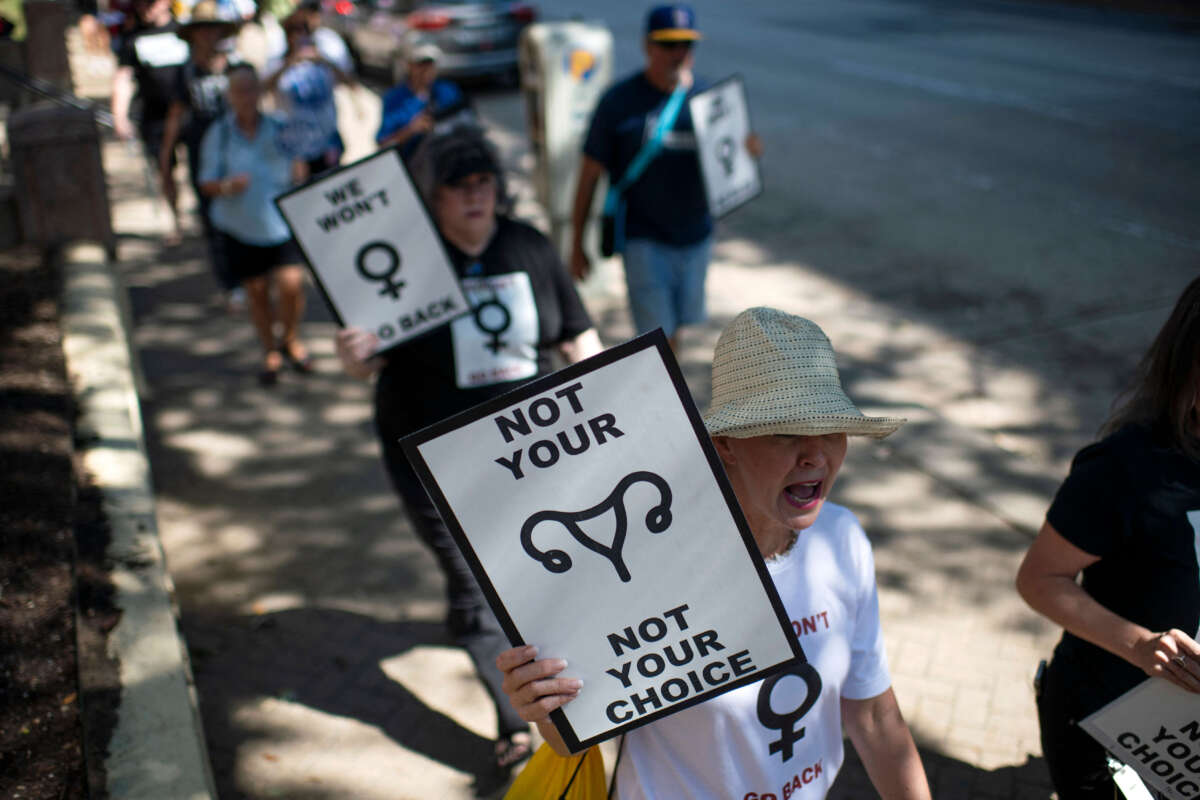A hearing in a lawsuit over Texas’s abortion ban was put on pause on Wednesday after a woman who recounted her traumatic pregnancy and birth threw up during her heart-wrenching testimony.
In a county courthouse in Austin, Texas, Samantha Casiano took the stand to describe how she was denied an abortion after learning that her baby had a fatal condition, forcing her to carry and give birth to a non-viable baby. At 20 weeks of gestation, Casiano was told that her baby had anencephaly, which meant that crucial parts of the brain and skull were not fully developed.
Her obstetrician gave Casiano options for funeral homes after telling her her baby would not survive. She described how she was forced to carry the pregnancy for another 13 weeks as she was unable to travel out of state to obtain an abortion. After she gave birth to her baby daughter, who she named Halo, Casiano held her baby in her arms for four hours, watching Halo turn cold and purple until she died.
Casiano apologized over and over while holding the body. “I was so sorry that I couldn’t help her or release her going to heaven sooner rather than later,” Casiano said. “I felt so bad. She had no mercy. There was no mercy there for her, and I couldn’t do anything.”
As she testified, Casiano sobbed and ultimately vomited, prompting the judge to call a recess. When the court reconvened, she described how she never used to throw up, but now does all the time when she recalls her trauma, saying, “I vomit when certain parts of what happen just kind of make my body remember.”
Casiano is one of the women in a lawsuit brought by 15 patients and doctors over Texas’s abortion ban, which bans abortions in most circumstances. She was one of three women who testified on Wednesday, essentially forced to relive their harrowing pregnancy experiences in order to plead for basic reproductive care in the state.
The other women who testified were equally as emotional on the stand, testifying through sobs.
Amanda Zurawski, the lead plaintiff in the case, described how she was in septic shock in the hospital due to her cervix dilating too early in her pregnancy when Texas’s trigger ban against abortion went into effect the day the Supreme Court overturned Roe v. Wade last summer.
A miscarriage was “inevitable,” a doctor told her, but they wouldn’t induce an abortion because doctors could still detect a fetal heartbeat. She was unable to travel to another state to obtain an abortion because doctors told her she needed to stay within 15 minutes of a hospital for her own safety.
“I had to listen to her heartbeat, simultaneously wanting to hear it and not wanting to hear it at the same time,” Zurawski testified through tears, per The Texas Tribune. Zurawski’s fertility has been permanently damaged because she was in sepsis for so long, with one of her fallopian tubes now forever closed.
Another plaintiff, Ashley Brandt, testified that she learned that one of the twins she was carrying had a fatal condition called acrania. Had she not traveled to Colorado to abort the nonviable fetus, she said, the other fetus may not have survived. Although the other fetus survived, Brandt testified that traveling to obtain the abortion was, in itself, a traumatizing experience, as she feared telling doctors that she was getting a procedure that was illegal in her home state.
State attorneys seemed unphased by the arguments, reporters say; as Zurawski tearfully testified about being denied an abortion, the state objected twice, saying that her testimony was “irrelevant” and that her description of what doctors told her was “hearsay.”
The womens’ stories are just a few of the likely hundreds — if not thousands — of people who are going through similarly traumatizing and life-threatening experiences due to abortion bans across the U.S. Research has found that, in the nine months after the downfall of Roe, there were an estimated 93,575 fewer legal abortions across the country versus pre-Dobbs v. Jackson, while countless other stories of babies dying shortly after birth or people’s lives being put at risk after being denied an abortion have come out since the bans went into effect.
Media that fights fascism
Truthout is funded almost entirely by readers — that’s why we can speak truth to power and cut against the mainstream narrative. But independent journalists at Truthout face mounting political repression under Trump.
We rely on your support to survive McCarthyist censorship. Please make a tax-deductible one-time or monthly donation.
